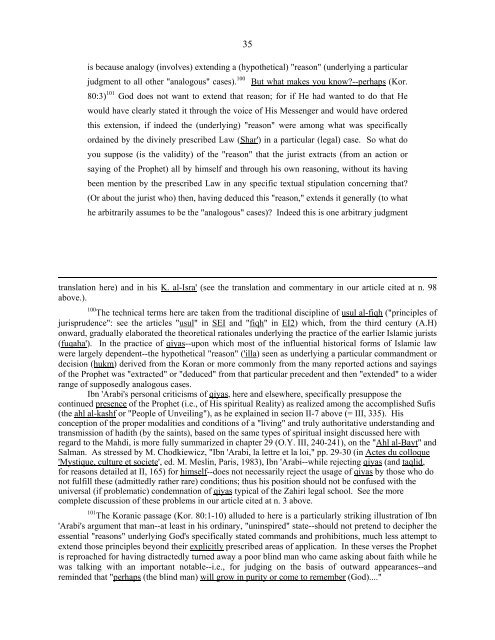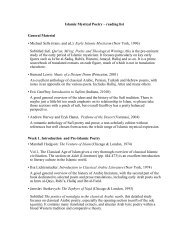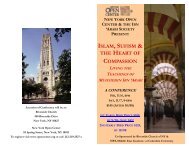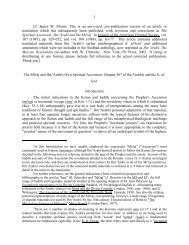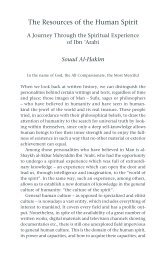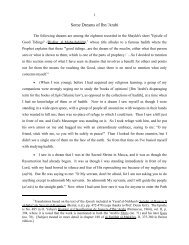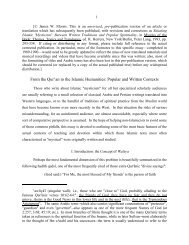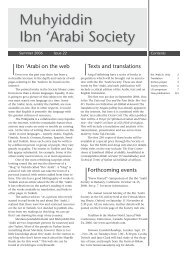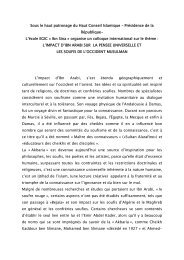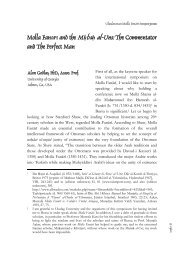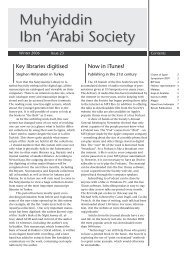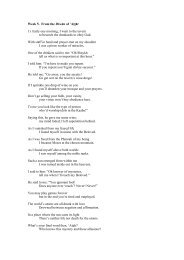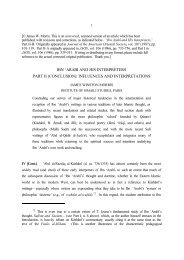The Mahdi and His Helpers - Muhyiddin Ibn Arabi Society
The Mahdi and His Helpers - Muhyiddin Ibn Arabi Society
The Mahdi and His Helpers - Muhyiddin Ibn Arabi Society
You also want an ePaper? Increase the reach of your titles
YUMPU automatically turns print PDFs into web optimized ePapers that Google loves.
35is because analogy (involves) extending a (hypothetical) "reason" (underlying a particularjudgment to all other "analogous" cases). 100 But what makes you know?--perhaps (Kor.80:3) 101 God does not want to extend that reason; for if He had wanted to do that Hewould have clearly stated it through the voice of <strong>His</strong> Messenger <strong>and</strong> would have orderedthis extension, if indeed the (underlying) "reason" were among what was specificallyordained by the divinely prescribed Law (Shar') in a particular (legal) case. So what doyou suppose (is the validity) of the "reason" that the jurist extracts (from an action orsaying of the Prophet) all by himself <strong>and</strong> through his own reasoning, without its havingbeen mention by the prescribed Law in any specific textual stipulation concerning that?(Or about the jurist who) then, having deduced this "reason," extends it generally (to whathe arbitrarily assumes to be the "analogous" cases)? Indeed this is one arbitrary judgmenttranslation here) <strong>and</strong> in his K. al-Isra' (see the translation <strong>and</strong> commentary in our article cited at n. 98above.).100 <strong>The</strong> technical terms here are taken from the traditional discipline of usul al-fiqh ("principles ofjurisprudence": see the articles "usul" in SEI <strong>and</strong> "fiqh" in EI2) which, from the third century (A.H)onward, gradually elaborated the theoretical rationales underlying the practice of the earlier Islamic jurists(fuqaha'). In the practice of qiyas--upon which most of the influential historical forms of Islamic lawwere largely dependent--the hypothetical "reason" ('illa) seen as underlying a particular comm<strong>and</strong>ment ordecision (hukm) derived from the Koran or more commonly from the many reported actions <strong>and</strong> sayingsof the Prophet was "extracted" or "deduced" from that particular precedent <strong>and</strong> then "extended" to a widerrange of supposedly analogous cases.<strong>Ibn</strong> '<strong>Arabi</strong>'s personal criticisms of qiyas, here <strong>and</strong> elsewhere, specifically presuppose thecontinued presence of the Prophet (i.e., of <strong>His</strong> spiritual Reality) as realized among the accomplished Sufis(the ahl al-kashf or "People of Unveiling"), as he explained in secion II-7 above (= III, 335). <strong>His</strong>conception of the proper modalities <strong>and</strong> conditions of a "living" <strong>and</strong> truly authoritative underst<strong>and</strong>ing <strong>and</strong>transmission of hadith (by the saints), based on the same types of spiritual insight discussed here withregard to the <strong>Mahdi</strong>, is more fully summarized in chapter 29 (O.Y. III, 240-241), on the "Ahl al-Bayt" <strong>and</strong>Salman. As stressed by M. Chodkiewicz, "<strong>Ibn</strong> '<strong>Arabi</strong>, la lettre et la loi," pp. 29-30 (in Actes du colloque'Mystique, culture et societe', ed. M. Meslin, Paris, 1983), <strong>Ibn</strong> '<strong>Arabi</strong>--while rejecting qiyas (<strong>and</strong> taqlid,for reasons detailed at II, 165) for himself--does not necessarily reject the usage of qiyas by those who donot fulfill these (admittedly rather rare) conditions; thus his position should not be confused with theuniversal (if problematic) condemnation of qiyas typical of the Zahiri legal school. See the morecomplete discussion of these problems in our article cited at n. 3 above.101 <strong>The</strong> Koranic passage (Kor. 80:1-10) alluded to here is a particularly striking illustration of <strong>Ibn</strong>'<strong>Arabi</strong>'s argument that man--at least in his ordinary, "uninspired" state--should not pretend to decipher theessential "reasons" underlying God's specifically stated comm<strong>and</strong>s <strong>and</strong> prohibitions, much less attempt toextend those principles beyond their explicitly prescribed areas of application. In these verses the Prophetis reproached for having distractedly turned away a poor blind man who came asking about faith while hewas talking with an important notable--i.e., for judging on the basis of outward appearances--<strong>and</strong>reminded that "perhaps (the blind man) will grow in purity or come to remember (God)...."


